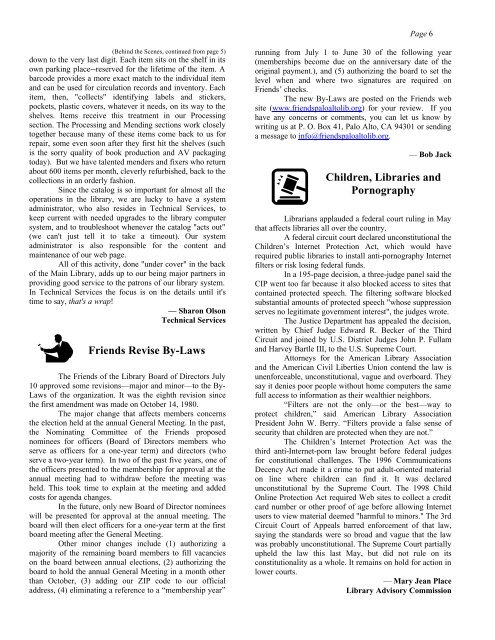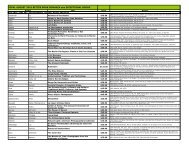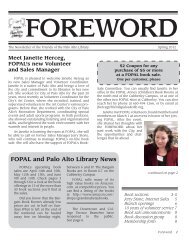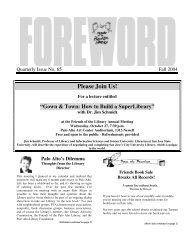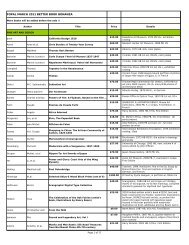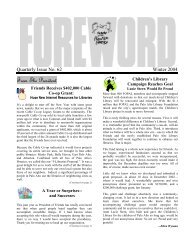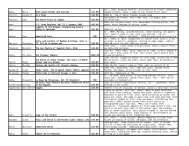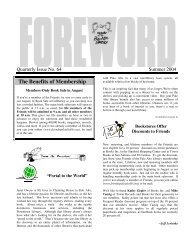Quarterly Issue No. 56 Summer 2002 - Friends of the Palo Alto Library
Quarterly Issue No. 56 Summer 2002 - Friends of the Palo Alto Library
Quarterly Issue No. 56 Summer 2002 - Friends of the Palo Alto Library
You also want an ePaper? Increase the reach of your titles
YUMPU automatically turns print PDFs into web optimized ePapers that Google loves.
Page 6<br />
(Behind <strong>the</strong> Scenes, continued from page 5)<br />
down to <strong>the</strong> very last digit. Each item sits on <strong>the</strong> shelf in its<br />
own parking place--reserved for <strong>the</strong> lifetime <strong>of</strong> <strong>the</strong> item. A<br />
barcode provides a more exact match to <strong>the</strong> individual item<br />
and can be used for circulation records and inventory. Each<br />
item, <strong>the</strong>n, "collects" identifying labels and stickers,<br />
pockets, plastic covers, whatever it needs, on its way to <strong>the</strong><br />
shelves. Items receive this treatment in our Processing<br />
section. The Processing and Mending sections work closely<br />
toge<strong>the</strong>r because many <strong>of</strong> <strong>the</strong>se items come back to us for<br />
repair, some even soon after <strong>the</strong>y first hit <strong>the</strong> shelves (such<br />
is <strong>the</strong> sorry quality <strong>of</strong> book production and AV packaging<br />
today). But we have talented menders and fixers who return<br />
about 600 items per month, cleverly refurbished, back to <strong>the</strong><br />
collections in an orderly fashion.<br />
Since <strong>the</strong> catalog is so important for almost all <strong>the</strong><br />
operations in <strong>the</strong> library, we are lucky to have a system<br />
administrator, who also resides in Technical Services, to<br />
keep current with needed upgrades to <strong>the</strong> library computer<br />
system, and to troubleshoot whenever <strong>the</strong> catalog "acts out"<br />
(we can't just tell it to take a timeout). Our system<br />
administrator is also responsible for <strong>the</strong> content and<br />
maintenance <strong>of</strong> our web page.<br />
All <strong>of</strong> this activity, done "under cover" in <strong>the</strong> back<br />
<strong>of</strong> <strong>the</strong> Main <strong>Library</strong>, adds up to our being major partners in<br />
providing good service to <strong>the</strong> patrons <strong>of</strong> our library system.<br />
In Technical Services <strong>the</strong> focus is on <strong>the</strong> details until it's<br />
time to say, that's a wrap!<br />
— Sharon Olson<br />
Technical Services<br />
<strong>Friends</strong> Revise By-Laws<br />
The <strong>Friends</strong> <strong>of</strong> <strong>the</strong> <strong>Library</strong> Board <strong>of</strong> Directors July<br />
10 approved some revisions—major and minor—to <strong>the</strong> By-<br />
Laws <strong>of</strong> <strong>the</strong> organization. It was <strong>the</strong> eighth revision since<br />
<strong>the</strong> first amendment was made on October 14, 1980.<br />
The major change that affects members concerns<br />
<strong>the</strong> election held at <strong>the</strong> annual General Meeting. In <strong>the</strong> past,<br />
<strong>the</strong> <strong>No</strong>minating Committee <strong>of</strong> <strong>the</strong> <strong>Friends</strong> proposed<br />
nominees for <strong>of</strong>ficers (Board <strong>of</strong> Directors members who<br />
serve as <strong>of</strong>ficers for a one-year term) and directors (who<br />
serve a two-year term). In two <strong>of</strong> <strong>the</strong> past five years, one <strong>of</strong><br />
<strong>the</strong> <strong>of</strong>ficers presented to <strong>the</strong> membership for approval at <strong>the</strong><br />
annual meeting had to withdraw before <strong>the</strong> meeting was<br />
held. This took time to explain at <strong>the</strong> meeting and added<br />
costs for agenda changes.<br />
In <strong>the</strong> future, only new Board <strong>of</strong> Director nominees<br />
will be presented for approval at <strong>the</strong> annual meeting. The<br />
board will <strong>the</strong>n elect <strong>of</strong>ficers for a one-year term at <strong>the</strong> first<br />
board meeting after <strong>the</strong> General Meeting.<br />
O<strong>the</strong>r minor changes include (1) authorizing a<br />
majority <strong>of</strong> <strong>the</strong> remaining board members to fill vacancies<br />
on <strong>the</strong> board between annual elections, (2) authorizing <strong>the</strong><br />
board to hold <strong>the</strong> annual General Meeting in a month o<strong>the</strong>r<br />
than October, (3) adding our ZIP code to our <strong>of</strong>ficial<br />
address, (4) eliminating a reference to a “membership year”<br />
running from July 1 to June 30 <strong>of</strong> <strong>the</strong> following year<br />
(memberships become due on <strong>the</strong> anniversary date <strong>of</strong> <strong>the</strong><br />
original payment.), and (5) authorizing <strong>the</strong> board to set <strong>the</strong><br />
level when and where two signatures are required on<br />
<strong>Friends</strong>’ checks.<br />
The new By-Laws are posted on <strong>the</strong> <strong>Friends</strong> web<br />
site (www.friendspaloaltolib.org) for your review. If you<br />
have any concerns or comments, you can let us know by<br />
writing us at P. O. Box 41, <strong>Palo</strong> <strong>Alto</strong>, CA 94301 or sending<br />
a message to info@friendspaloaltolib.org.<br />
— Bob Jack<br />
Children, Libraries and<br />
Pornography<br />
Librarians applauded a federal court ruling in May<br />
that affects libraries all over <strong>the</strong> country.<br />
A federal circuit court declared unconstitutional <strong>the</strong><br />
Children’s Internet Protection Act, which would have<br />
required public libraries to install anti-pornography Internet<br />
filters or risk losing federal funds.<br />
In a 195-page decision, a three-judge panel said <strong>the</strong><br />
CIP went too far because it also blocked access to sites that<br />
contained protected speech. The filtering s<strong>of</strong>tware blocked<br />
substantial amounts <strong>of</strong> protected speech "whose suppression<br />
serves no legitimate government interest", <strong>the</strong> judges wrote.<br />
The Justice Department has appealed <strong>the</strong> decision,<br />
written by Chief Judge Edward R. Becker <strong>of</strong> <strong>the</strong> Third<br />
Circuit and joined by U.S. District Judges John P. Fullam<br />
and Harvey Bartle III, to <strong>the</strong> U.S. Supreme Court.<br />
Attorneys for <strong>the</strong> American <strong>Library</strong> Association<br />
and <strong>the</strong> American Civil Liberties Union contend <strong>the</strong> law is<br />
unenforceable, unconstitutional, vague and overboard. They<br />
say it denies poor people without home computers <strong>the</strong> same<br />
full access to information as <strong>the</strong>ir wealthier neighbors.<br />
“Filters are not <strong>the</strong> only—or <strong>the</strong> best—way to<br />
protect children,” said American <strong>Library</strong> Association<br />
President John W. Berry. “Filters provide a false sense <strong>of</strong><br />
security that children are protected when <strong>the</strong>y are not.”<br />
The Children’s Internet Protection Act was <strong>the</strong><br />
third anti-Internet-porn law brought before federal judges<br />
for constitutional challenges. The 1996 Communications<br />
Decency Act made it a crime to put adult-oriented material<br />
on line where children can find it. It was declared<br />
unconstitutional by <strong>the</strong> Supreme Court. The 1998 Child<br />
Online Protection Act required Web sites to collect a credit<br />
card number or o<strong>the</strong>r pro<strong>of</strong> <strong>of</strong> age before allowing Internet<br />
users to view material deemed "harmful to minors." The 3rd<br />
Circuit Court <strong>of</strong> Appeals barred enforcement <strong>of</strong> that law,<br />
saying <strong>the</strong> standards were so broad and vague that <strong>the</strong> law<br />
was probably unconstitutional. The Supreme Court partially<br />
upheld <strong>the</strong> law this last May, but did not rule on its<br />
constitutionality as a whole. It remains on hold for action in<br />
lower courts.<br />
— Mary Jean Place<br />
<strong>Library</strong> Advisory Commission


